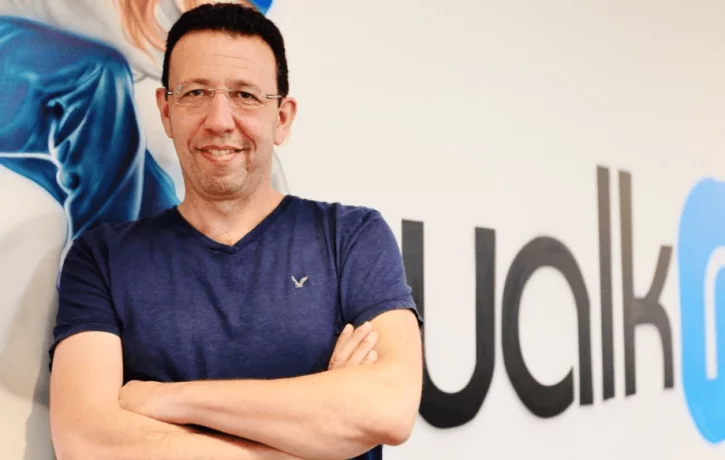FinTech, Bitcoin, Blockchain, ICO, Mobile transfers — it seems like everyday there is new technology on the market. It can be difficult to keep up. To get some guidance, we turned to our very own VP Finance, David Sussely. We wanted to know how WalkMe is keeping up with FinTech trends — and better yet — paving the way for an even brighter financial future.
WalkMe: Tell us a bit about yourself and your role at WalkMe.
David: I joined WalkMe 1 year ago to head the finance department after working 8 years abroad. It seemed like a challenging enough reason to come back, which proved a perfect decision as the company is on an amazing path of growth and success.WalkMe: What professional resources do you read? Favorite blogs/websites/magazines?
David: Naturally, I read daily finance and economic news to stay updated on global trends. I also like listening to podcasts on management and reading specific SaaS related subjects such as:- Manager Tools
- HBR Podcasts
- The SaaS Revolution Show
- SaaStr Podcasts
WalkMe: Where do you see the future of finance heading? Should we start expecting payments in Bitcoin?
David: I would say that the future, and even the role of modern CFOs will need to be much more IT centered and skill based. The focus will be on utilizing and relying on digital adoption tools to simplify and create efficiency, but also to make sure we are secure. With everything moving to the cloud and online technology, new measures will need to be taken to ensure organizations’ security.As far as Bitcoin, I’m not so sure we will see a large adoption in the near future. I believe the psychological and symbolic aspects to a nation’s currency are underestimated. Currency is a reflection of the economic power of a region. However, Bitcoin is leading the way for a unification and simpler means of transferring currency. I see currencies like Bitcoin having a future in online transactions, especially as companies expand and go global. Every day we see more technology created to transfer even small amounts of money. Some countries are even choosing to adopt no cash policies.“The future will be in utilizing and relying on digital adoption tools to simplify and create efficiency.”
WalkMe: Which tasks do you predict will be automated in the next 5 years?
David: Main processes where I’d like to see much more automation are: procurement, employee reimbursements, fixed assets control, analytics, employee onboarding, and any banking transactions. All of these changes will result in a better experience for the user, and as a result, a more secure and efficient process for the company.WalkMe: Reducing costs and consolidating the company’s finances must be high on your agenda. What software are you using to boost employee productivity and consolidate data in order to reduce costs?
David: When I first joined WalkMe, we used several different applications to perform each financial task. Unsurprisingly, it was not a very efficient process. Now we’ve adopted a central ERP system serving all of our legal entities and are working on automated interfaces to other applications to minimize manual work and increase efficiency. All of these new technologies ease tasks for our global offices as well. For example, an employee in our San Francisco office can submit an expense for an approval in Australia with just a click of a button, no need for excel sheets and snail mail.Maximize your ERP efficiency with WalkMe today.
WalkMe: What do you think are the main reasons for the explosion in FinTech and digital adoption in banking and finance sector?
David: I think it stems from two main pain points:- Security: The biggest pain-point in financial transactions is the security of financial property and ensuring a successful transaction from A to B. Since the financial crisis of 2008 we have seen a big emphasis and expectation from big banks and financial institutions to abide by new regulations and kick security up a notch. The public demands it.
- Simplicity and Visibility: This includes simplifying and ensuring visibility of transactions and following the trail of transfers. New financial technologies are being created and adopted just for these needs.
WalkMe: Looking back on your years of experience, what advice would you give to other CFOs?
David: I am a firm believer in investing in the training of your employees and increasing efficiency. Employees need to see the broader function of their role in a company to perform at their best, and open sessions, KPIs and most importantly, visibility, are ways to encourage this. Especially in finance, there are many different segments — payroll, booking, FPMA, legal — everybody has a piece of the picture. One way we have achieved this efficiency ourselves is through the implementation of WalkMe.Another tip is to save money by implementing adaptive insights for budgeting and for upper management to track costs through BI applications, things that today would be very time consuming in a program like excel. Bottom line I think any CFO should take a strong look at their employees’ daily tasks and ask: How can I significantly simplify processes, tasks, and team structure.“Bottom line — I think any CFO should take a strong look at their employees’ daily tasks and ask: How can I significantly simplify processes, tasks, and team structure.”


